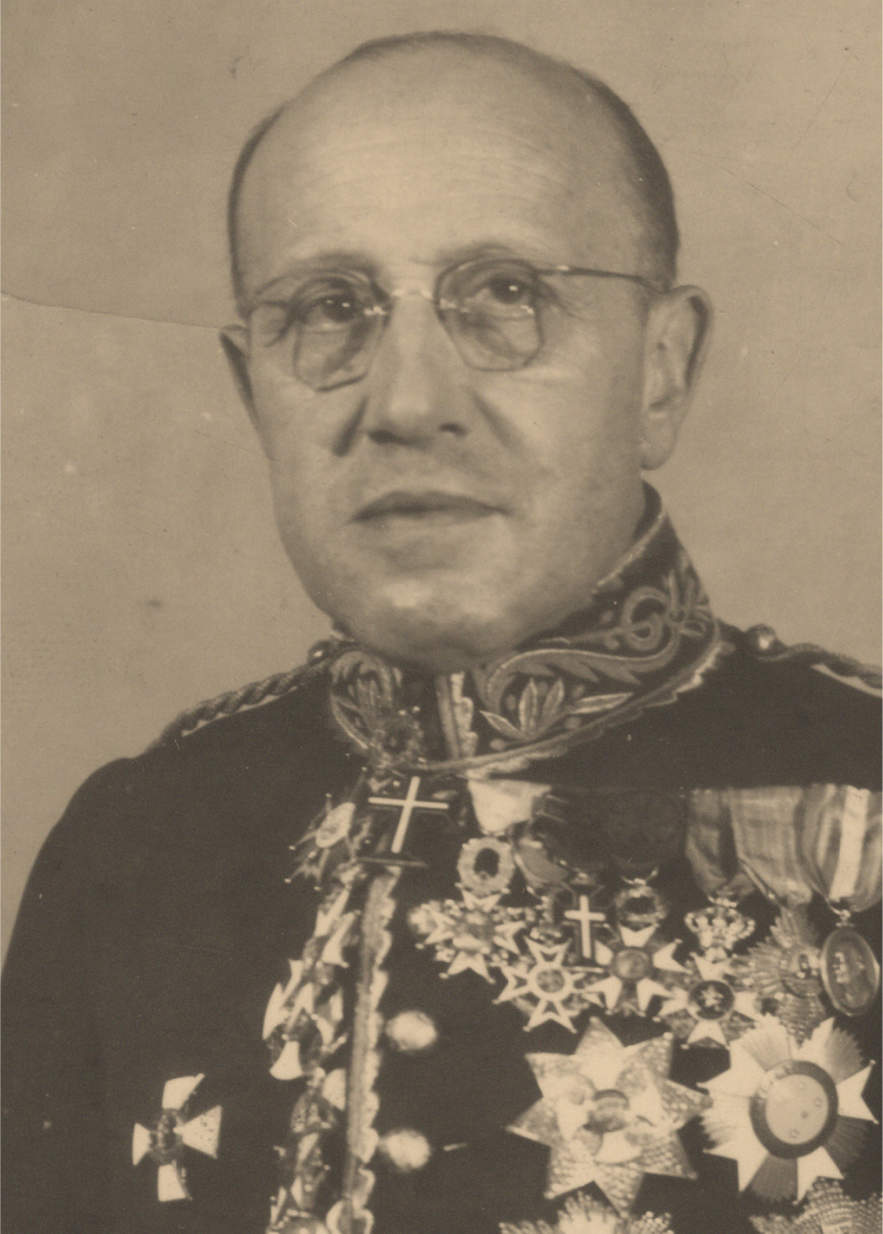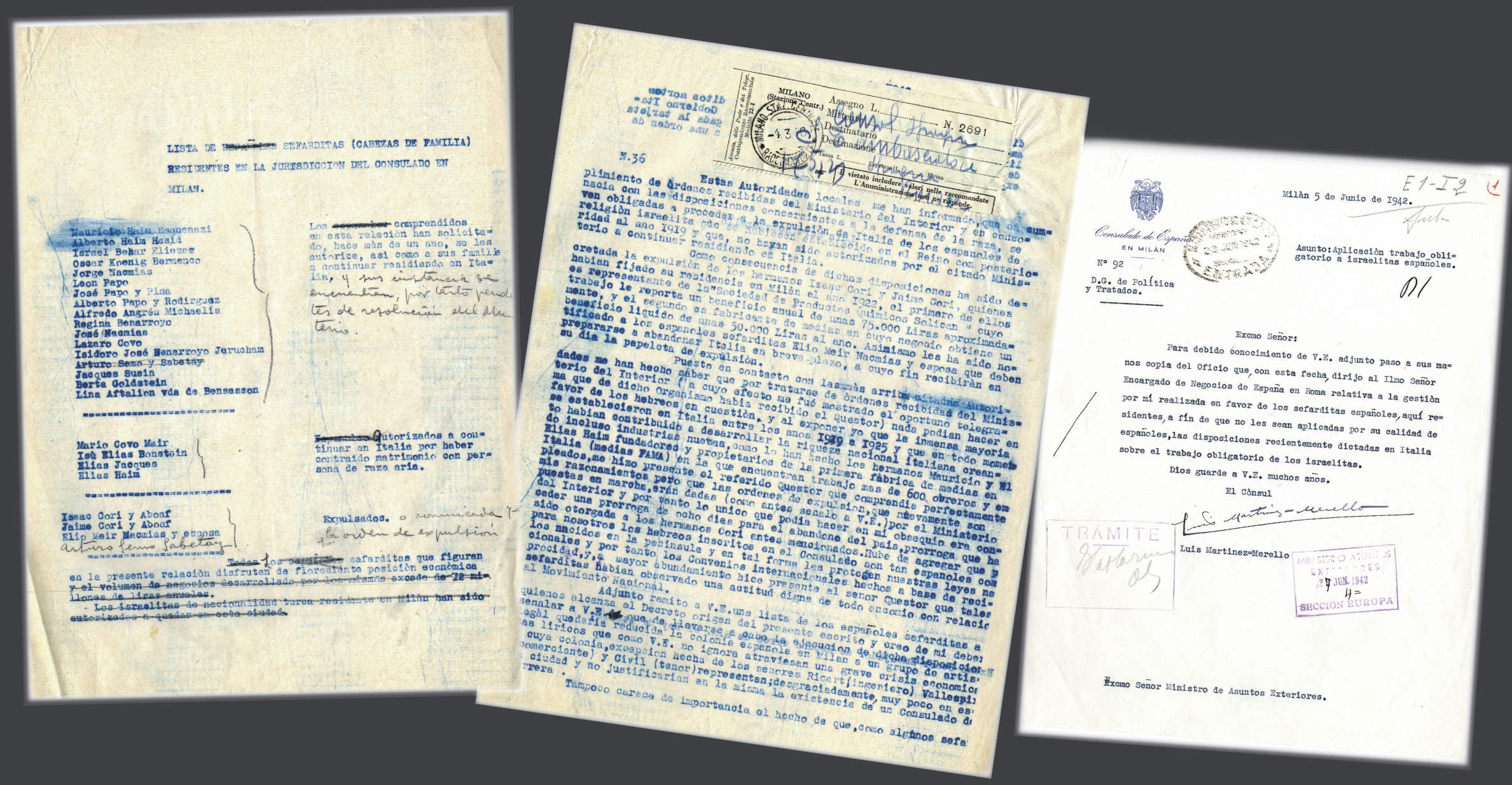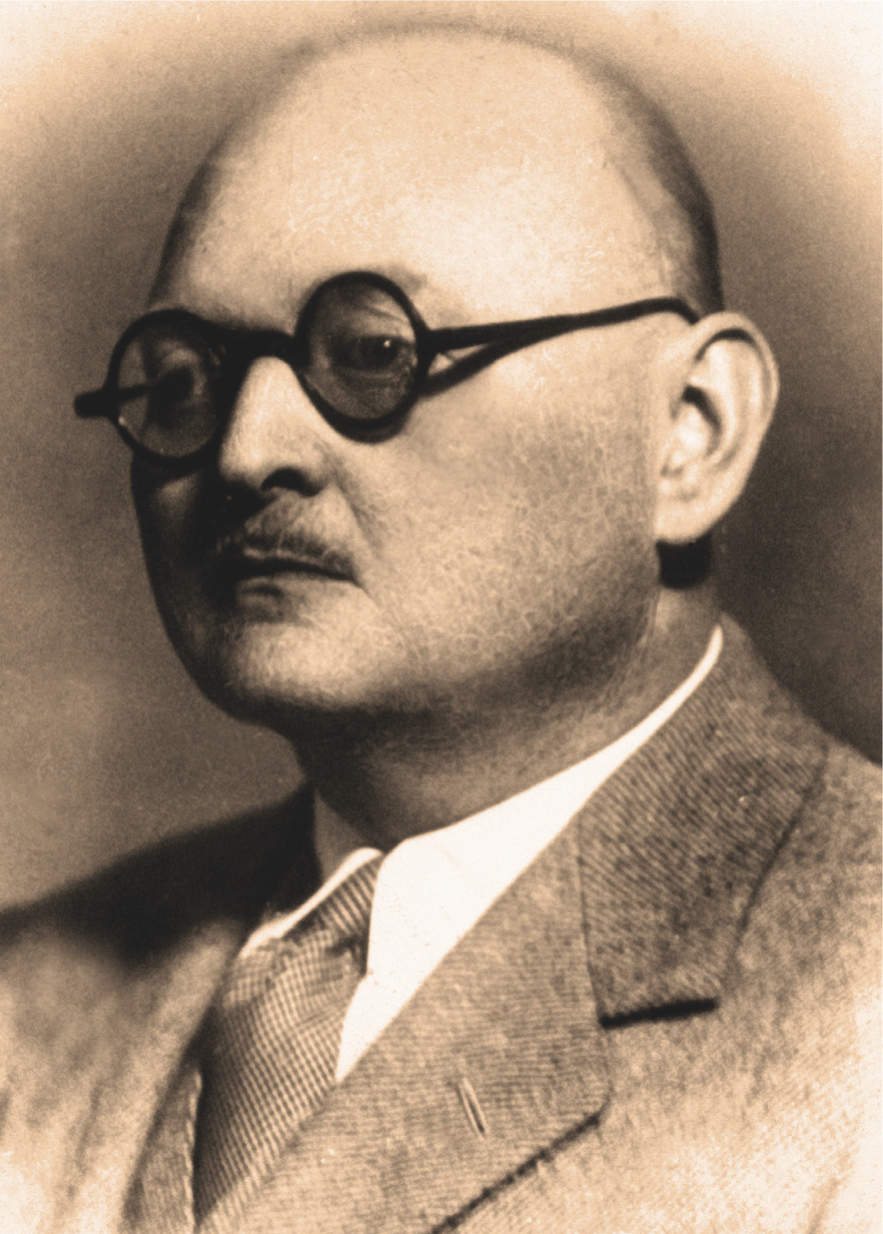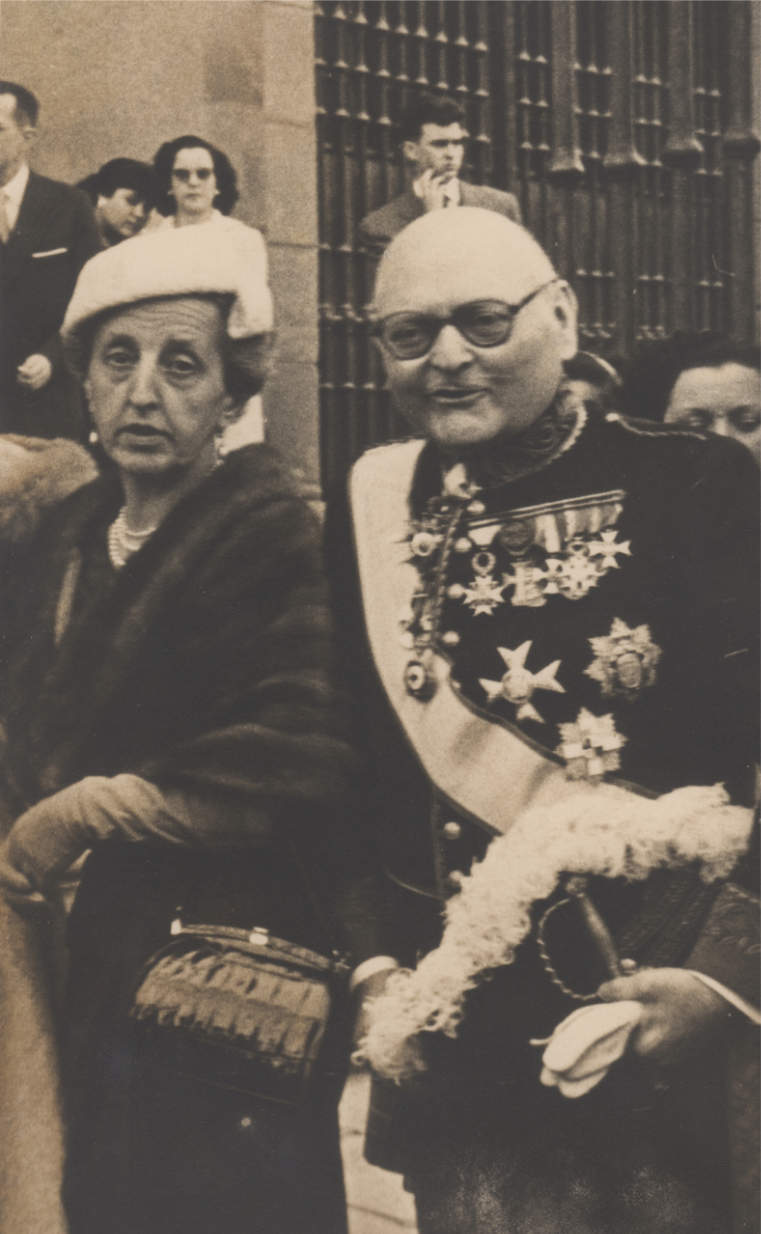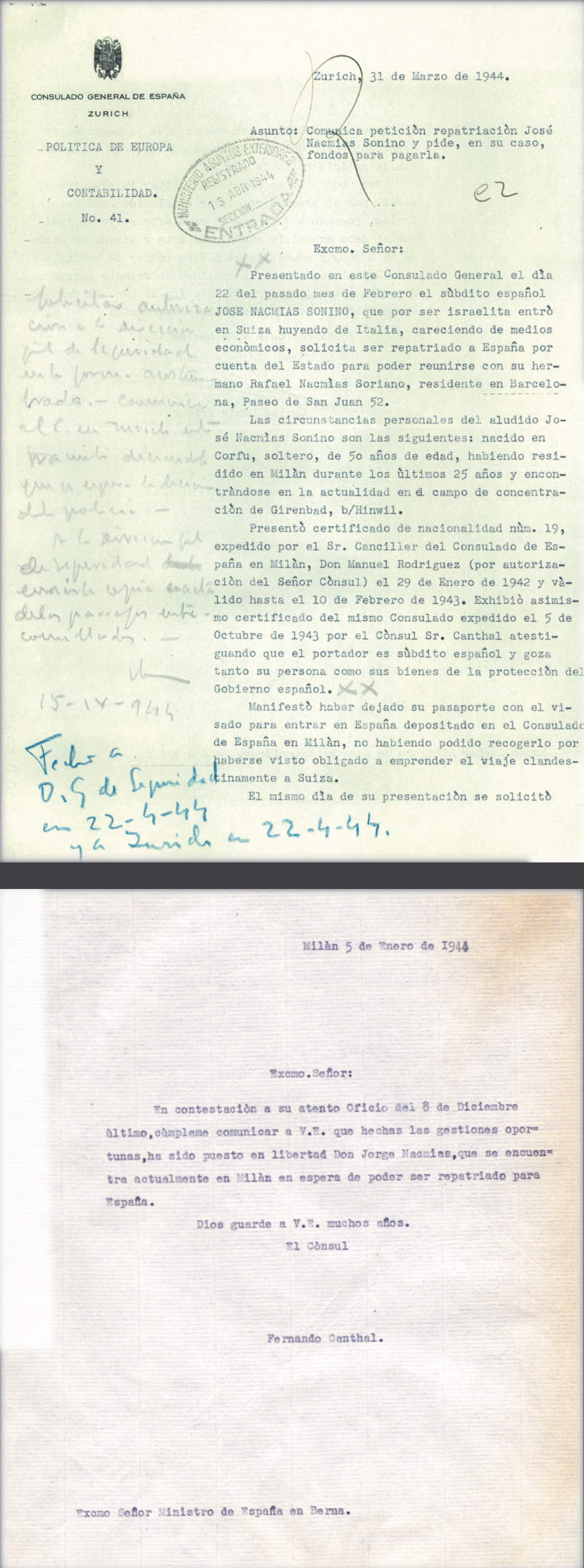CONSUL GENERAL (MILAN 1937-1942)

LUIS MARTÍNEZ MERELLO Y DEL POZO
Anticipating exit
In October 1937, in the midst of the Spanish Civil War, Luis Martínez Merello y del Pozo (1892-1958) was appointed Consul General in Milan. He would be posted there for five years and seven months.
His first contact with the Sephardic world had taken place in Tetouan, where he had been posted to the High Commissariat of Spain in Morocco between 1930 and 1931. However, the situation of the Jewish community in the Spanish Protectorate was very different from what he would find in Milan.
From September 1938, foreign Jews — Spaniards among them — that had arrived in Italy after January 1919 had to leave the country within six months. This decree and others that would later be enacted by the Rome government were considered, on paper, even more drastic than those of Germany. When these racist laws were passed, some 45 Sephardim with Spanish nationality were residing in Italy, almost all of them in Milan.
However, the application of these provisions regarding the "defence of race" were not a matter of concern for Spanish Jews until the spring of 1940. Until then, Martínez Merello's diplomatic protection had made it possible for 19 families to be authorized to continue residing in Milan, even though 16 of them were awaiting a definitive decision. The other three authorizations had been granted through marriage to persons of the Aryan race. There was only one case of expulsion: that of Arturo Semo.
In March 1940, Martínez Merello complained to the local authorities in Milan about the decision by the Directorate-General for Demography and Race to deport four Jewish Spaniards: the brothers Isaac and Jaime Cori together with Elio Meir Nacmias and his wife. After obtaining a deferral, Martínez Merello stated: "For us, Jews registered at the Consulate are as Spanish as those born on the Iberian Peninsula and as such, they are protected by our national laws and, therefore, by international agreements concluded on the basis of reciprocity." The expulsion orders were not cancelled, but he made it possible for them not to be enforced.
In May 1942, the situation worsened: a thousand foreign Jews were interned in Italian concentration camps. Subsequently, in June, a new decree was approved establishing a Mandatory Work Service for Jews, incorporating them into battalions to carry out public or military works.
In view of this measure, Martínez Merello informed the prefect of Milan that he took it for granted that it would not be applied to Sephardim with Spanish nationality, basing his argument on the validity of the Consular Agreement between Spain and Italy of 21 July 1867. Specifically, he interceded on behalf of Elkan Papo y Levi, a Spanish Jew baptized as a Catholic, resident in Fiume, with a great fortune and a member of the Falange Party since April 1938. The Consul's protection exempted him from being forced to join a work battalion.
At the time, certain Spanish Jews were being called to the Prefecture's Aliens Office to be notified of their obligation of submitting to the local police documents declaring their status and race which they had been given at their homes. The Consul advised all his "fellow countrymen of the Hebrew race", as he liked to say, not to submit to these declarations.
He would need to use his influence again in the case of Lina Aftalion, Bensasson’s widow. She was a Sephardic Spaniard who was informed of her deportation from Italy, after having been refused a stay permit. The Council’s intervention guaranteed that she could stay in Milan, together with one of her daughters, married to an Italian, who was seriously ill.
With the rise in anti-Semitic incidents, Martínez Merello realized that the situation could deteriorate quickly. Therefore, at his own initiative, he decided to help his Jewish fellow countrymen to leave for Spain while it was still possible. In late September 1942, he personally provided passports and visas to several families from the Spanish cornmunity, thus making it possible for them to settle in Barcelona. Among these families were those of José Papo and Rafael Nacmias.
Between 1939 and 1944, of the 40 Spanish Jews living in Milan, 28 moved to Barcelona and 10 to Switzerland.
Martínez Merello died in Madrid at the age of 66, when he was Director for Relations with the Holy See.
CONSUL GENERAL (MILAN 1943-1945)

FERNANDO CANTHAL Y GIRÓN
Parl Playing a double game: between Mussolini and the partigiani
Fernando Canthal y Girón (1896-1964) arrived in Milan in July 1943, from the Legation in Switzerland. In Berne, he had helped some of the Jews who had been saved by crossing the border from Italy. He was 47, and a renowned expert in international law.
As soon as he took up his post, the Spanish community requested his protection because, since the departure of his predecessor, Martínez Merello, in May, the Milan Prefecture, following orders from the Directorate-General for Demography and Race, was sending notifications to incorporate six Jews with Spanish nationality into a work battalion: José Benarroyo, Jorge and Olga Nacmias, Orefice and Mauricio Barcilon, and Mariana Lalet Esinzia.
This decision was revoked thanks to the complaints of the Spanish Embassy in Rome to the Italian Foreign Ministry, and of the new Consul to the local authorities. In February 1944, Canthal granted passports and organized the repatriation to Barcelona of one of the six, José Benarroyo, together with another five members of his family. Even though Benarroyo's expulsion had been ordered, he was still residing in Italy with his mother thanks to the former Consul.
By then, the Spanish Consulate had gained diplomatic clout because Milan had become the capital of the Republic of Saló (Italian Social Republic), a puppet state of Nazi Germany in northern Italy, led by Benito Mussolini since 23 September 1943. Madrid did not wish the new state to be officially recognized, but it asked the Consul to use whatever political benefits it was granted, while at the same time having an attitude of courteous reservation. Therefore, under complex circumstances following the German occupation and intensified persecution of Jews, the diplomat did his utmost to protect and repatriate the Jewish Spaniards who were still in Milan and its surroundings.
In October 1943 a Spanish Jew, Mario Covo Mair, whose wife was Aryan, was arrested. Canthal got Covo liberated thanks to his good relations with the German Consul General, who even apologized for the detention.
Showing great audacity in the face of the Fascist authorities of Saló and of the German occupation authorities, in 1944 Canthal appointed as Vice-Consul the young Spanish Jew Isù Elias Borni, a long-time resident in Milan, also sheltering as refugees his parents, Gisela Borni and Santiago Elias, who had been Vice-Consul of Spain in Sofia for many years.
With Canthal's complaints and intervention before the German High Commissioner in the area, the Gauleiter Friedrich Rainer, Canthal was able to give protection to the houses, furniture and other property of Spanish Jews in Fiume. Noteworthy is the case of Elkan Papo, finally repatriated to Spain in February 1944 on a special train organized by the Consulate-General in Genoa for the Spanish community. Canthal also arranged the evacuation of another two Jews from Milan on that same train, Haim Papo and Jorge Nacmias — the latter having been liberated, transferred to Milan and granted a regular passport by Canthal to facilitate his evacuation.
José Nacmias fled from Milan after his brother Jorge was captured, and clandestinely crossed the Italian-Swiss border, with no time to collect the passport, with a visa, that Canthal had prepared for him. Thanks to the fact that Nacmias presented, at the Legation in Bern, the nationality certificate Canthal had given him in October 1943, he was able to accredit his Spanish nationality and enjoy consular protection. Therefore, he was also repatriated.
During the 20 months that the Republic of Saló lasted, Canthal was able to win the consideration of the Duce himself, who, in the last months of his life, wanted to entrust to Canthal negotiating his surrender with British diplomats in Bern, or the escape of part of his family via Spain.
The Consul also made use of his good relations with the partigiani, or partisans, in order to help Jews reach Switzerland through the mountains or hide in the country houses in Brianza or in the Lecco mountains. The partigiani were grateful to Canthal for his help in recruiting several young Spanish workers - who had escaped Germany and were to be repatriated to Spain - for the Lorenzini Brigade, attached to the Christian Democratic party.
After serving as an ambassador in Haiti and Pakistan, Fernando Canthal died in Madrid at the age of 68.

 Loading
Loading

